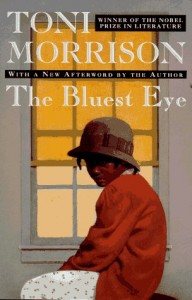 Only a few months after Toni Morrison’s novel The Bluest Eye was challenged in an Adams County, Colorado, school district, an Alabama state senator is calling the book “just completely objectionable” and says that it should be removed from classrooms and school libraries. Sen. Bill Holtzclaw (R-Madison) called for the ban last week, citing references to rape, incest, and child molestation.
Only a few months after Toni Morrison’s novel The Bluest Eye was challenged in an Adams County, Colorado, school district, an Alabama state senator is calling the book “just completely objectionable” and says that it should be removed from classrooms and school libraries. Sen. Bill Holtzclaw (R-Madison) called for the ban last week, citing references to rape, incest, and child molestation.
Holtzclaw, who is currently running for re-election, ruffled state and local GOP feathers earlier this year because he failed to support a bill that would have blocked implementation of Common Core curriculum standards in Alabama. Common Core began as a bipartisan effort by governors and state education commissioners to develop standard nationwide benchmarks for K-12 students in public schools and has been adopted in 45 states (including Alabama) and the District of Columbia. But the actual implementation of the standards has met with resistance from some conservatives, who see Common Core as a federal takeover of education even though it’s not a federal program.
Since The Bluest Eye is listed as an exemplar text for meeting the 11th grade English Language Arts standards, out-of-context excerpts from the novel have recently been turning up on right-wing blogs and resistance to this book in particular has become something of a cause célèbre. Common Core does not require states or school districts to adopt any particular readings; Alabama’s Department of Education simply points out that “the list and excerpts [from exemplar texts] should prove extremely useful in assisting local school systems and schools in developing local reading lists.”
Sen. Holtzclaw defied the party line during this year’s state legislative session, as he refused to support a bill that would have blocked the implementation of Common Core in Alabama. All five of the school districts he represents supported the standards, he said, and lawmakers would be acting outside their purview if they interfered. His position led some members of the Madison County Republican Executive Committee to call for an official censure of Holtzclaw, although the group ran out of time in last month’s meeting before it could vote on the action. But when a constituent subsequently contacted him about The Bluest Eye being a Common Core exemplar text, Holtzclaw seemed to change his tune on legislative interference at the school district level, saying that he wanted to “ensure that [the book] is not on any reading list in the state of Alabama.” He also noted that while he was not aware whether any school libraries in the state have copies of the novel (they certainly do), he would “probably” advocate removing those as well.
The day after Holtzclaw voiced his opposition to The Bluest Eye, two members of the Alabama Board of Education joined in. District 2 representative Betty Peters called the book “pornographic” and “utterly inappropriate,” while her colleague Stephanie Bell said that she also would support removing the book from the list of exemplar texts, but it was “just a drop in the bucket in terms of the problems associated with Common Core.”
So, to recap: At least three high-ranking Alabama officials are publicly supporting a pre-emptive ban on a book that is not required by Common Core (because there are no books required by Common Core!). They do so likely without having read the entire book, and definitely without bothering to find out whether it’s currently taught in Alabama schools or held in school libraries. And as happens all too often, they appear to have fallen into the trap of thinking that books dealing with terrible things that exist in the real world are somehow endorsing those actions or events. They might instead take a hint from Bailey Cross, the Colorado high school student who organized a counter-petition against the challenge to The Bluest Eye in Adams County. At a school board meeting last month, Cross stated:
Banning and censoring this [book] tells students that…racism, incest, rape, abuse, are taboo subjects that should not be mentioned. It sends the message that [someone] experiencing these things should not reach out for help, because if it’s too explicit to read, it’s too explicit to talk about.
Please help support CBLDF’s important First Amendment work by making a donation or becoming a member of the CBLDF!
Maren Williams is a reference librarian who enjoys free speech and rescue dogs